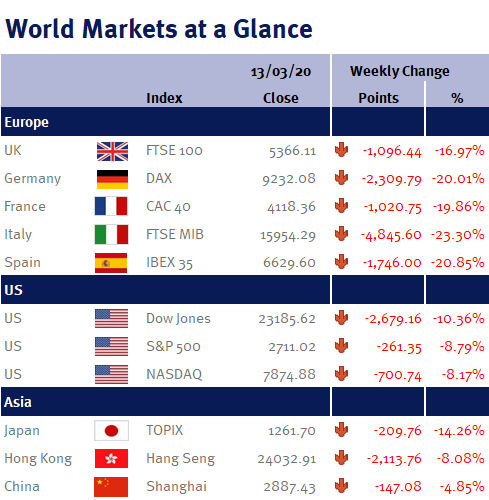As you can see from the accompanying table, to say it’s been a difficult week is an understatement – and no doubt, many of you are worried about your health as well as your wealth.
With the global equity market volatility we have seen over the past three weeks, it isn’t surprising if you, like many of our clients, are worried – and I would like to reassure you that your portfolios are diversified across a variety of asset classes. While this diversification hasn’t stopped your portfolios from falling, it has helped to protect against bigger losses. For example, at tonight’s close (Friday 13 March 2020), the FTSE-100 is now down 29.60% since the last Portfolio Valuation Statement dated 5 January 2020, while a typical Cautious risked client is down 12.63%; Balanced -20.20%; and Adventurous -20.50% over the same period.
While we appreciate that coronavirus is dominating news headlines and we fully understand and appreciate that the current equity market weakness is unpleasant and unnerving, it is very important to maintain a long-term perspective and resist the urge to react to every new rumour or development. We structure your portfolios and then manage them to ensure they remain properly diversified and are appropriate for your long-term goals, time horizon and tolerance for risk.
There will always be periods of market uncertainty and volatility and this current period is no different – however, my wealth takes a long-term approach to investing, because evidence shows that this leads to better outcomes, as time in the market is more important than trying to time the market.
Equity markets hate uncertainty and thanks to the scars from the global financial crisis in 2008/9, equity markets have tended to react disproportionately to any uncertainty or disappointment – and unfortunately, this is one of those periods where panic has gripped financial markets. However, we believe that this has been indiscriminate and emotionally-driven, and that as a result, it may not actually require much good news for global equity markets to rebound quickly.
Unfortunately, this week although we had a proactive and joined-up approach between the BoE and the UK government with an aggressive and coordinated stimulus package, the actions from the European Central Bank and Donald Trump failed to calm market nerves, while the restrictions on the movement of people further weighed on sentiment.
However, we firmly believe that this week’s collapse in the oil price is positive as it is the equivalent of a massive tax cut for users – which helps to make up some of the shortfall from Europe and the US. For example, global oil consumption is approximately 100m barrels a day – and the cost of a barrel of Brent has dropped to just $33 from $45 last week and $69 at the start of the year. This $36 decline roughly equates to $3.6bn of stimulus per day – (which is a massive $1.3tr per annum).
Consequently, while the path for financial markets is unlikely to be smooth (we fully expect market volatility will remain elevated in the short-term), we are confident that global equity markets will be higher by the end of the year.
During these turbulent times we will continue providing our daily market updates – so please check back with us as we will provide you with our thoughts on all the market moving events across the world. For example, from the US on Monday (16 March 2020) we have the US Empire State manufacturing index; retails sales data on Tuesday (17 March 2020); and then on Wednesday (18 March 2020) a Fed monetary policy meeting – and obviously this has even more significance than normal and we are expecting US policymakers to cut US interest rates aggressively and lay the foundations for additional stimulus measures, such as further QE and lending facilities.
Elsewhere, on Monday we have Chinese retail sales; and on Tuesday (17 March 2020) we have UK employment data (unemployment rate and weekly earnings).
Investment Management Team


